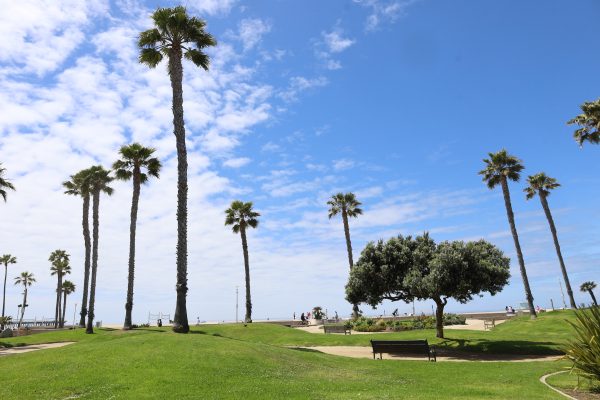
As Hermosa Beach became an increasingly popular night-life destination over the last decade, residents have grown correspondingly weary over the impacts that late-night traffic brings. The concentration of alcohol-serving establishments in and around Pier Plaza has become a source of crime. Hermosa police issued 600 alcohol- and public nuisance-related citations in the previous year.
In response, the city redefined its approach to enforcement of the issue. At a March City Council meeting, the council altered the definition of “restaurant” in the city’s municipal code, jettisoning the requirement that alcohol sales constitute no more than 50 percent of business at a restaurant serving liquor. Rather than compelling all businesses to submit records demonstrating compliance, the so-called “50-50 rule” has become an enforcement tool to be used when businesses encounter other problems, such as noise complaints or violence.
The change was intended to provide clarity and administrative ease. And it came as the city attempts to shed its image as the home of raucous revelry and attract the kind of restaurants that have made neighboring Manhattan Beach a Southern California dining destination.
Throughout the year, particularly during the campaign for city council seats in November’s elections, elected officials and candidates have focused on how to make the city’s downtown more “family friendly.” The results have been a mixed bag, as the city occasionally struggles against its own laws as it attempts to redefine itself.
Test case

The city’s effort to push for upscale restaurants in the downtown area came to the fore when the City Council had to decide in September whether to revoke the conditional use permit for Establishment on Hermosa Avenue.
The Planning Commission voted three-to-two at its June meeting to revoke the business’ CUP, citing Establishment’s ongoing failure to provide audited quarterly reports demonstrating that alcohol sales constitute no more than 50 percent of its business. Establishment owner Dave Lowe argued that he had done all that was required, and raised concerns that the city’s auditing methods lacked sufficient guarantees of security.
Even though the City Council had changed the reporting requirements, Establishment was one of four businesses in the downtown area — along with the Standing Room, Waterman’s and Dia de Campo — required to demonstrate compliance with the 50-50 rule under the terms of its CUP. In Establishment’s case, the requirement was a holdover from Blue 32, the business that Lowe previously operated at the same location.
In the weeks leading up to the council meeting, Lowe raised questions about the wisdom of a rule requiring equality of sales between food and alcohol. He noted that ordering a nice bottle of wine with dinner could easily throw an individual meal out of the ratio, and argued that the rule incentivizes businesses to offer cheaper drinks and more expensive food, which could potentially increase public intoxication.
The City Council’s decision held high stakes for Lowe. Upholding the Planning Commission’s revocation would mean he had no CUP to operate, leaving him unable to sell his business to another tenant.
At the packed meeting that would decide the business’ fate, council members struggled to reconcile the issue with competing aspects of the city’s push to transform its downtown.
“I don’t like people out there thinking that Hermosa Beach is not business friendly, but I also don’t want them thinking, ‘Oh, this is Hermosa Beach, we can do whatever we want,” said Councilman Peter Tucker.
Ultimately, the council agreed to reverse the planning commission’s decision, and allow Lowe to keep his CUP. The council also modified some of the restrictions that would attach to the property, allowing businesses operating there to stay open later.
They did so, however, only with the assurance of the property owner, Bolour Associates, that Lowe would not remain as a tenant. Bolour told the council that it was scouting a series of prospective owners to purchase the business from Lowe, all of whom would operate a high-class restaurant.
As of the close of this year, the location that once housed Establishment was vacant, and Bolour had yet to decide on a new tenant.
Family-friendly future

Since the decision on Establishment, other opportunities for city action on restaurants and bars reveal that the city is still feeling its way through attempts to reshape the downtown area.
The owners of Laurel Tavern, a successful gastropub in Studio City, have sought to open a second location in Hermosa Beach in the location formerly occupied by Game Changers. The CUP governing the property came from Sharks Cove Hermosa, a billiard hall, open till 2 a.m. daily, with a full liquor license and CUP that did not require it to serve food.
After acquiring the property, the owners of Laurel Tavern went before the Planning Commission to seek amendments to the CUP. The owners were planning to get rid of the billiard tables, increase the size of the kitchen, and reduce the maximum occupancy, all of which were in line with the kind of business that the council wanted to bring to the city. The commission approved the amendments, but also used the opportunity to change the operating hours, requiring the new business to close at midnight.
The owners appealed to the City Council to adjust the decision. A representative of Laurel Tavern argued that it was unfair to limit the business’ hours when the only reason the city had an opportunity to do so was because Laurel Tavern had sought to change the business to make it less dependent on alcohol sales.
Nonetheless, the council remained skeptical that many people would actually be eating, as opposed to simply drinking, after midnight, and the spectre of approving yet another business open into the early morning hours was simply too much. The council ultimately attempted to craft a middle path, approving the midnight closing time, but preserved the business’ status as an existing late-night establishment. This allows Laurel Tavern to return in 2016 and petition for an extra hour of operation on weekend nights.
The council’s decision revealed how hard it will be to actually implement their vision for downtown.
“This is one of the most anti-business things I have seen in a while,” said Councilman Michael Divirgilio. “I think everybody would rather have a Laurel Tavern than a Game Changers. They come to us trying to change for the better, and we double down on them.”










